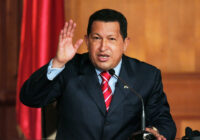From Korea to Vietnam and then on to Afghanistan, Iraq, Libya and Syria, the US has consistently demonstrated its alacrity to act as global legislator, regulator, problem-solver and policeman. The role has evolved slightly in recent years. Instead of direct military presence it has drifted towards massive engagement with other nations such as Saudi Arabia (Yemen), Ukraine (Russia) and Israel (Gaza), where it embraces the moral and geopolitical ambiguity of proxy wars. In the background is the idea of ridding the world of some threatening evil.
But good and evil have become harder to distinguish, and as one military fiasco replaces another in the media’s headlines, the image of the US military as a “force for good” committed to human rights and promoting democratic values has been seriously tarnished across the expanse of the globe.
What the rest of the world thinks about US global military dominance is, of course, irrelevant. It only becomes a problem when prominent members of one of the two ruling parties at home begin to express doubts about the effectiveness of what has long stood as the second pillar of a “normalized world order.” The first pillar is the US dollar, now coming under increasing pressure as multipolar drift erodes its historical monopoly as the world’s reserve currency.
When, back in 1944, the wise delegates at Bretton Woods elected a gold-backed dollar as the foundation of a reorganized global economy, the US understood that it had an unlimited source of funding permitting its military presence in every available region of the world. The dollar owned the global economy. It will, of course, continue to dominate, but the sense that its expansion is unlimited is quickly disappearing.
The defeat of Germany and Japan left two gaping holes in the geopolitical landscape, providing an opportunity to massively install the US military in Europe and East Asia. The Monroe Doctrine of 1823 had long before made Latin America secure. That left Africa, West and Southeast Asia as the zones in which the ambiguity of the Cold War might actively play out. It was in those regions escaping from European colonialism that unlimited investment in military bases could be made. That’s where domino-fueled wars could erupt, with no perceived limit on their funding.
We are at what US President Joe Biden likes to call an “inflection point” in history. For the first time in nearly eighty years, doubt has come to the fore concerning the justification for a global military presence. Nature may abhor a vacuum, but not quite as much as Washington’s elite abhors doubt. As defined by the nation’s founding fathers, democracy empowers the people over institutions. Increasingly, the needs of institutions have come to trump the needs and desires of the population.
Americans are uncomfortable with a hard-to-define but deeply disappointing status quo embodied by what Ralph Waldo Emerson characterized as the “foolish consistency” of its leaders. That mood of doubt contributed powerfully to the election of Donald Trump in 2016. It may have a similar effect in 2024. It has incited certain influential Republicans to block further funding for the war in Ukraine, which Democrats herald as a sacred cause, though they have never been clear about why. Now it has begun affecting the Biden administration’s unconditional support of Israel as it wages its visibly sadistic war on a defenseless, occupied population.
Biden’s Secretary of Defense Lloyd Austin wishes to quell those doubts. Last week, he had a pair of somewhat contradictory messages for the American people. The first was the risk that Israel’s genocidal fervor against Palestinian civilians might “replace a tactical victory with a strategic defeat.” Let’s get this done, but with less sadism, if you please. The second was more in line with Emerson’s “foolish consistency” when Austin, a former Raytheon board member, urged the nation to “reject calls to turn away from global interests and become more isolationist.” In other words, the US must not give up on its noble commitment to wars.
The Washington Post offered its take on Austin’s speech at the Reagan National Defense Forum. “Defense Secretary Lloyd Austin on Saturday denounced those who advocate ‘an American retreat from responsibility’ and said sustained U.S. leadership is needed to help keep the world as safe, free and prosperous as possible.”
We learn that “Austin delivered a lengthy defense of U.S. support to Israel in its war against Hamas and to Ukraine.” Austin claimed “the world will only become more dangerous if tyrants and terrorists believe that they can get away with wholesale aggression and mass slaughter.”
Unintentional irony? If literally applied to the situation in Gaza, those whose aggression and slaughter merits the epithet “wholesale” are clearly the Israelis, who are handling devastation as a bulk order. In comparison, the Hamas-led attack on October 7 could only be called “retail,” that is, limited in scope and duration.
Exceptionally, today’s Weekly Devil’s Dictionary offers two definitions:
Leadership:
- Military domination thanks to an unrivalled capacity for unlimited, unconstrained and unaudited spending. (US)
- The ability of an individual or a group of people to influence and guide followers or members of an organization, society or team. (Rest of the world)
Responsibility:
- Coercive military presence in every region of the world. (US)
- The state or fact of being accountable or to blame for something. (Rest of the world)
Contextual note
For thinkers like Emerson, “responsibility” implied refraining from exercising undue influence or coercion. “Act responsibly” translates as “act cautiously.” To the Secretary of Defense, the US is militarily “responsible” for imposing solutions elsewhere around the globe. In contrast, Emerson wrote: “The President proclaims war, and those Senators who dissent are not those who know better, but those who can afford to … Democracy becomes a government of bullies tempered by editors.”
If he were alive today, Emerson would probably remain just as critical of bullying politicians and the role of money in politics. But he would probably have far less confidence in the media (“editors”), who today do nothing to temper the bullies.
Though wishing to spare civilians, Austin believes deeply in Washington’s vocation as the unique global bully. He chose an odd metaphor to express it. “Those who ‘try to pull up the drawbridge,’ he said, undermine the security that has led to decades of prosperity.”
This is particularly odd because the point of a drawbridge is to seal the entrance of a castle against an enemy attack. The Secretary of Defense envisions it as the opening that makes it possible for the owners of the castle to go out and threaten others.
Historical note
Austin’s rhetoric gives away a lot more than he intended. It is symptomatic of a slow historical degradation of the language of politics (especially geopolitics), just as he used both “leadership” and “responsibility” in ways that undermine their historical meaning.
Austin displays a notable failure to notice the unintentional irony contained in his language. Complaining about lawmakers who have become reticent to fund overseas wars, he offered this: “Our competitors don’t have to operate under continuing resolutions. And doing so erodes both our security and our ability to compete.”
The first point of irony is his obvious impatience with democracy, a system that requires lawmakers to pass “resolutions” instead of simply allowing presidents, at least since Emerson’s time, to “proclaim war” and get on with it. The second irony lies in his choice of the word “resolutions.” One of the clearest explanations of why Hamas launched its attack on October 7 is the long history of Israel’s refusal to comply with a litany of United Nations resolutions.
We should even wonder about Austin’s concern for civilians and his warning about “a tactical victory with a strategic defeat.” Does he really want us to think that massacring civilians can make “tactical” sense? Many pundits have pointed out that Israel cannot defeat Hamas. Citing historical precedents, Emir Hadžikadunić made that case in Fair Observer last month.
Related Reading
In his book 1984, George Orwell warned the world that exercising abusive political power requires perverting language, depriving it of its organic meaning by inverting its perceived meaning. The US may not win its multiple wars, but, if Austin’s example proves anything, Washington’s “leadership” in practicing Orwell’s art of Newspeak remains unrivaled.
*[In the age of Oscar Wilde and Mark Twain, another American wit, the journalist Ambrose Bierce produced a series of satirical definitions of commonly used terms, throwing light on their hidden meanings in real discourse. Bierce eventually collected and published them as a book, The Devil’s Dictionary, in 1911. We have shamelessly appropriated his title in the interest of continuing his wholesome pedagogical effort to enlighten generations of readers of the news. Read more of Fair Observer Devil’s Dictionary.]
The views expressed in this article are the author’s own and do not necessarily reflect Fair Observer’s editorial policy.
Support Fair Observer
We rely on your support for our independence, diversity and quality.
For more than 10 years, Fair Observer has been free, fair and independent. No billionaire owns us, no advertisers control us. We are a reader-supported nonprofit. Unlike many other publications, we keep our content free for readers regardless of where they live or whether they can afford to pay. We have no paywalls and no ads.
In the post-truth era of fake news, echo chambers and filter bubbles, we publish a plurality of perspectives from around the world. Anyone can publish with us, but everyone goes through a rigorous editorial process. So, you get fact-checked, well-reasoned content instead of noise.
We publish 2,500+ voices from 90+ countries. We also conduct education and training programs
on subjects ranging from digital media and journalism to writing and critical thinking. This
doesn’t come cheap. Servers, editors, trainers and web developers cost
money.
Please consider supporting us on a regular basis as a recurring donor or a
sustaining member.
Will you support FO’s journalism?
We rely on your support for our independence, diversity and quality.











Comment